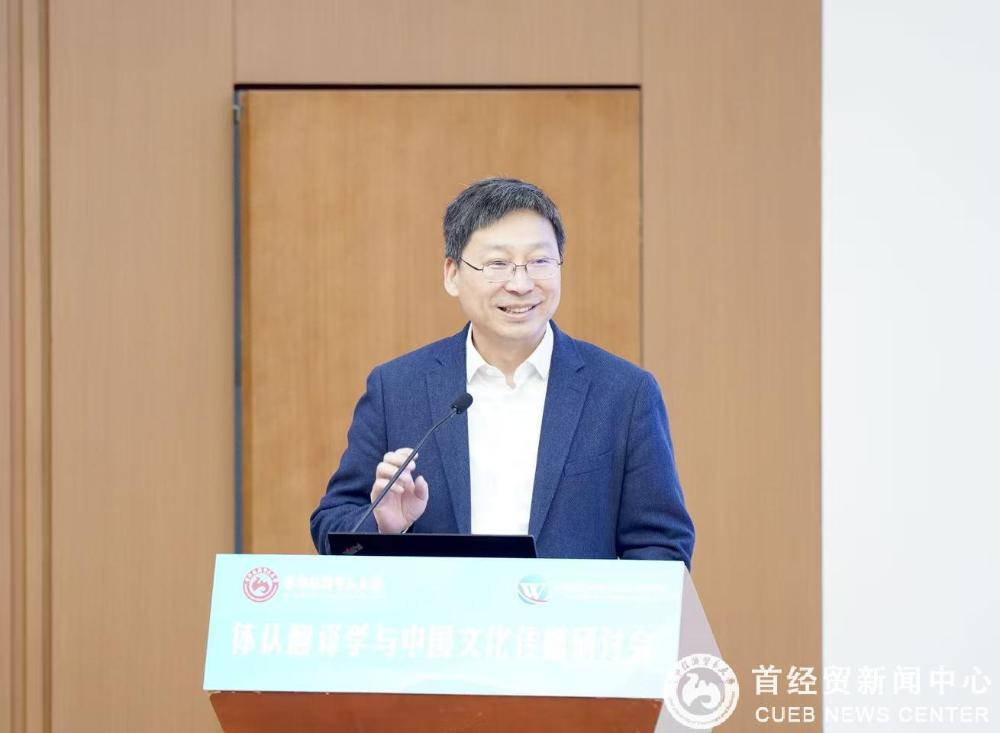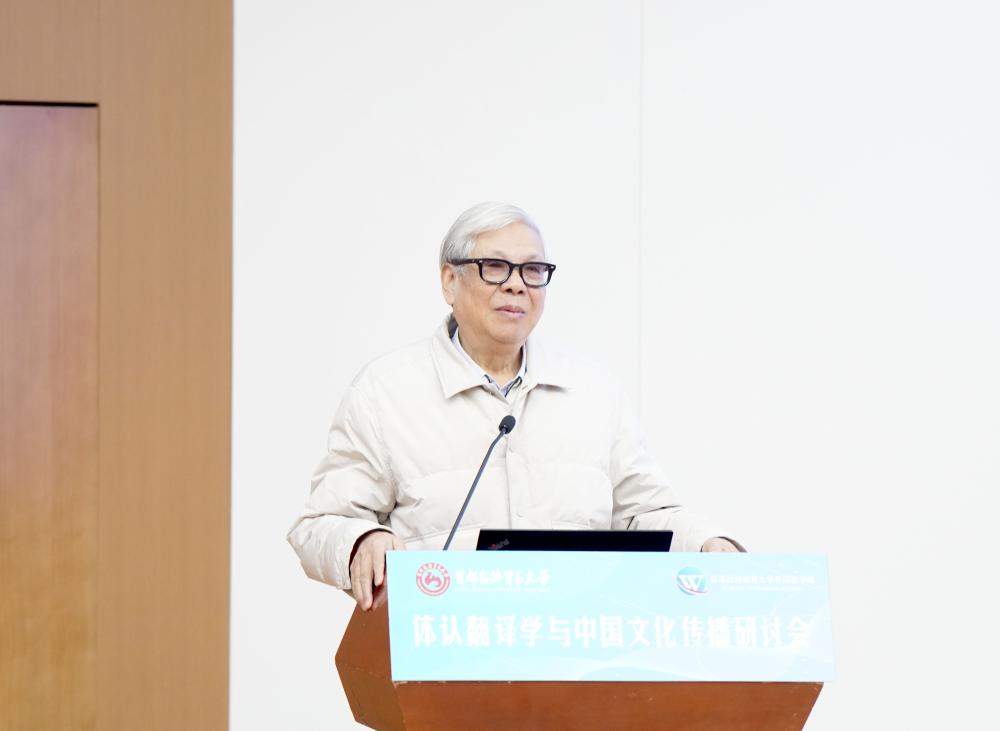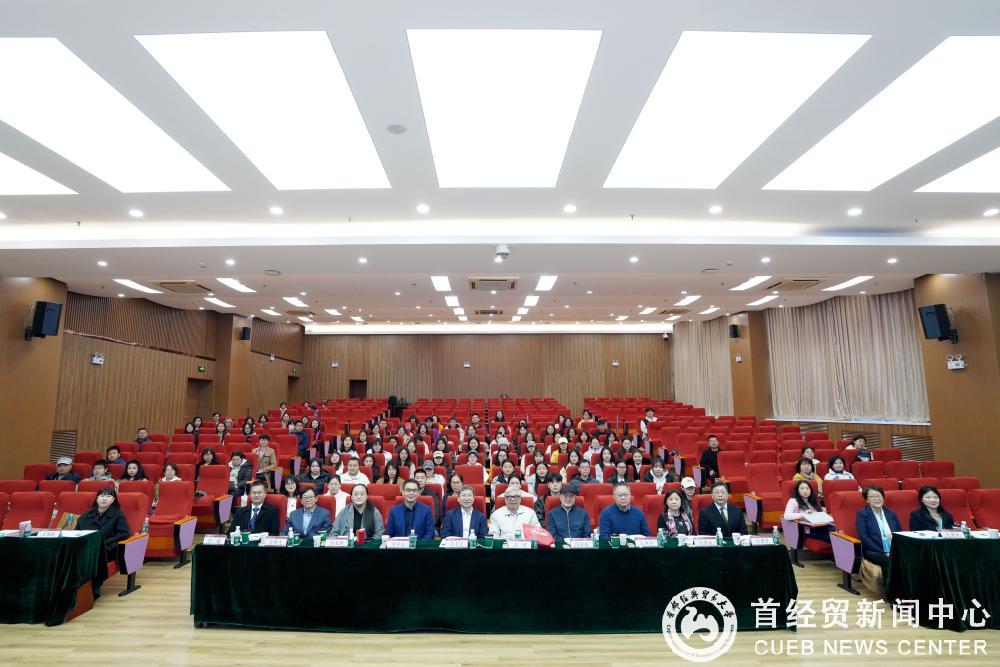School of Foreign Studies Hosts Symposium on Embodied-Cognitive Translatology and Chinese Cultural Communication
On November 1, the Symposium on Embodied-Cognitive Translatology (ECT) and Chinese Cultural Communication was held at CUEB. Wu Weixing, Deputy Secretary of the Party Committee and president of CUEB, delivered an opening address.

In his address, Wu highlighted CUEB’s commitment to integrating humanities with applied disciplines. ECT, as a frontier field bridging linguistics, translatology, and cultural communication, not only aligns with the university’s motto of “Advocating Morality, Valuing Competence, Strategizing National Development, and Serving the People”, but also provides theoretical support for global cultural exchange. He emphasized that the university will continue to offer academic resources and platform for translation research, encouraging faculty and students to deepen their engagement and produce more outcomes that balance theoretical depth with practical application.

Wang Yin, President of the Chinese Association for Embodied Cognitive Linguistics and Professor at Sichuan International Studies University, spoke at the symposium. He outlined his academic work, noting that “the humanities and sciences are like a person’s two legs—both are indispensable”. He illustrated how linguistic theories need practical tools from computer science such as AI-aided translation, while the optimization of AI algorithms also needs guidance from linguistics. He further clarified that “AI should be an important assistant, not the sole solution”, warning against the trap of “technological omnipotence” and always taking human cognition and cultural understanding as the core of translation.
Chang Shaohua, Associate Editor of Foreign Languages in China, then shared the journal’s perspective on embodied-cognitive translation studies. He stated that as a core foreign language journal, Foreign Languages in China has been focusing on this emerging field in recent years, publishing multiple related papers. Nevertheless, he emphasized the need for more high-quality submissions and committed to offering expedited review procedures for scholars in this field to accelerate the dissemination of rigorous research.
Zhou Changyin, Editor of the Journal of Beijing International Studies University , outlined the journal’s measures to promote embodied-cognitive linguistics and translatology. He mentioned that the journal has launched a special column, “Embodied-Cognitive Linguistics and Cross-Cultural Communication,” which has published papers applying the theory to diverse fields such as literary translation, business translation, and teaching Chinese as a foreign language. It has generated significant academic influence. He hoped this symposium would yield more innovative theoretical achievements. The journal would prioritize publishing high-quality papers to expand the column’s coverage and academic value, thereby fostering a closer academic community in embodied-related disciplines.
Liu Wenjing, Director of Peking University Press, acknowledged Wang’s academic leadership. She hoped that all attendees would be inspired by the symposium and produce more outstanding research.
In the keynote address session, Professor Wang delivered an in-depth presentation titled “Theory and Practice of Embodied-Cognitive Translaology from the Perspective of New Liberal Arts”. He proposed that within the postmodern philosophical framework, “Metaphysics” does not carry the traditional negative connotations, and he called upon scholars in Marxist philosophy to provide more cutting-edge theoretical support for the field. Wang emphasized that “linguistics and philosophy mutually nurture each other” and that “the barriers between literature, history, and philosophy should be dismantled”. Using the translation of Red Mansions as an example, he argued that translators need literary appreciation, historical insight, and philosophical reasoning to accurately convey the cultural essence of the original work.
Kang Zhifeng, Vice President of Heilongjiang International Studies University and Professor at Fudan University, delivered an online report titled “New Embodied-Cognitive Perspectives on AI-Augmented Translation and Interpretation During the Transition Period”. He emphasized that “the humanities remain the soul and are indispensable” with the rapid development of AI. While AI excels at efficient language conversion, it cannot replace human comprehension and judgment regarding cultural contexts, emotional nuances, and implied meanings.
Kong Lingcui, Professor of Sichuan Normal University, conducted a discussion around the theme of “Highbrow and Lowbrow: The Academic and Popular Nature of ECT”. He proposed that the field should not only pursue the theoretical depth but also pay attention to the popular dissemination. The “highbrow” means exploring the essence of translation and cognitive mechanisms, while the “lowbrow” lies in adapting theories into operable methods for ordinary translators. He emphasized that “practice is the sole criterion for testing truth” and “insufficient embodiment leads to cognitive bias”. Kong warned that insufficient experience inevitably leads to cognitive bias in translation.
Zhang Sumin, Professor of Zhejiang Gongshang University, focused on “The Impact of Continuation Translation on the Processing of L2 Emotional Words Among Foreign Language Learners with Different Levels of Language Enjoyment from the Perspective of ECT”, demonstrating the combination of embodied cognitive theory and empirical research. She introduced that the reaction time for processing negative words and neutral words in the single-text translation group was significantly faster than that in the reading-followed-by-translation group. The situational consistency in the processing of emotional words by translators under the embodied mode of reading-followed-by-translation was the highest, which is more conducive to improving the accuracy of emotional word processing for translators with lower language enjoyment.
Zhang Ling, Professor of Guizhou Normal University, started from the transition from “teaching Chinese as a foreign language” to “international Chinese education” and delivered a report titled “Embodied Practice in the Translation and International Communication of Yangming Culture”. He pointed out that nowadays, the importance of cultural communication has become increasingly prominent, and Wang Yangming’s School of Mind is a cornerstone of traditional Chinese culture. He emphasized that “the purpose of translation determines its methods”: when targeting academic readers, literal translation can be retained with additional annotations; when facing the general public, a more popular free translation should be adopted.
Li Tenglong, Associate Professor of CUEB, proposed that “Chinese characters are not merely linguistic symbols, but also spatial manifestations of cognitive pattern, embodying the inherent unity of language, cognition, and reality”.
Lv Shisheng, Professor of Beijing Language and Culture University and Vice Chairman of the Committee for International Business English Studies of CCOIC Commercial Chamber of Commerce (CIBES), discussed the “Cognitive Anchor Teaching Method”, transforming technology from a substitute threat into a catalyst for cognitive evolution, and promoting the paradigm shift of business translation education from skill transmission to the cultivation of decision-making wisdom.
Li Chunlan, Professor of Geely University of China, focused on “Automotive Brand Translation and Cultural Adaptation from the Perspective of Embodied Cognition”, analyzing adaptation strategies with cross-border cases.
In addition, the symposium held two parallel sub-forums for in-depth discussions among participants on embodied cognition translation and Chinese cultural communication.
At the closing ceremony, Professor Kong highly praised the symposium’s academic value and fruitful communication, emphasizing the important role of ECT in promoting the communication of Chinese culture and facilitating interdisciplinary integration.

The holding of this symposium is like a melting pot of ideas, bringing together the wisdom of the academic community. In the future, the School of Foreign Studies will continue to build a platform for in-depth academic exchange, promoting the development of ECT and helping Chinese culture go global.
The symposium attracted over 100 participants, comprising experts in ECT, editors of core journals, publishing representatives, and faculty and student representatives from CUEB.
HOT NEWS
- 1 School of Foreign Studies Hosts Symposium on Embodied-Cognitive Transl...
- 2 School of Foreign Studies Hosts Symposium on Embodied-Cognitive Transl...
- 3 CUEB Signs Letter of Intent with University of Alberta
- 2025 Overseas Universities International Education Fair: CUEB Special ...
- CUEB Hosts The College Board China Annual Conference 2025
